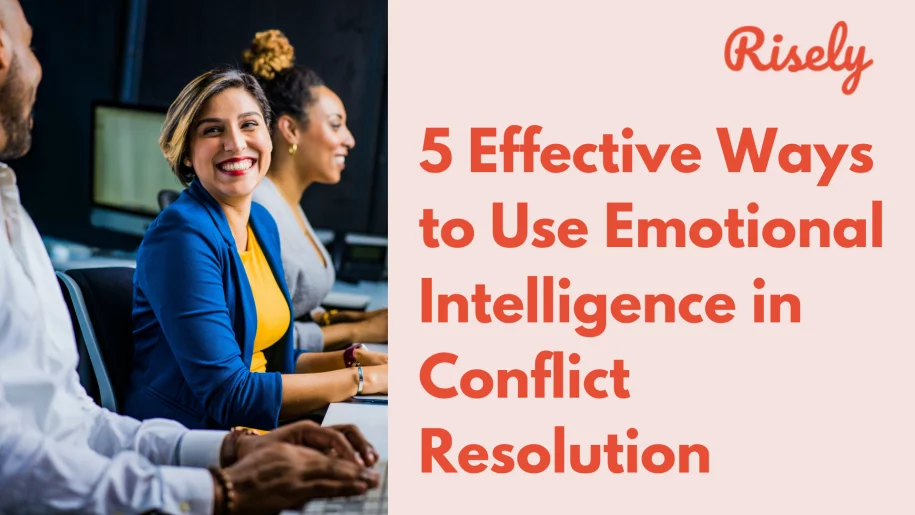5 Effective Ways to Use Emotional Intelligence in Conflict Resolution
It’s no secret that conflicts are inevitable in every aspect of life, personal or professional. However, what sets successful individuals apart is their ability to resolve conflicts effectively. One essential tool for conflict resolution is emotional intelligence (EI). EI is the ability to identify, understand, and manage one’s emotions and those of others. This blog will dive into how EI can help you navigate conflicts successfully. We will discuss the role of EI in conflict management and provide five practical ways to use it in resolving conflicts. So whether you’re dealing with a disagreement at work or a personality clash in a team, these tips will guide you toward resolving conflicts with grace and ease.Understanding Emotional Intelligence in Conflict Resolution
One of the most significant challenges in conflict resolution is managing emotions effectively. Emotional intelligence can help individuals understand and manage emotions to handle conflicts better. The ability to regulate emotions, understand others’ perspectives, and communicate effectively are all essential components of emotional intelligence in conflict resolution. By incorporating these skills into conflict resolution strategies, individuals can find common ground with others and create win-win outcomes that benefit everyone involved. Developing emotional intelligence skills takes practice and effort but is a valuable investment in personal and professional relationships.Defining Emotional Intelligence and Conflict Resolution
Emotional intelligence is crucial for navigating conflicts and disputes. At its core, emotional intelligence is the ability to recognize, understand, and manage our own emotions and those of others. Conflict resolution involves addressing disagreements or disputes between individuals or groups. By utilizing emotional intelligence in conflict resolution, individuals can better understand their own emotions and the emotions of others involved in the conflict. This increased understanding allows for more effective communication, leading to a greater chance of finding common ground and reaching mutually beneficial solutions. Ultimately, emotional intelligence plays an essential role in promoting positive personal and professional relationships.Role of emotional intelligence in conflict management
Effective conflict management requires emotional intelligence, which involves being aware of one’s own emotions and the emotions of others. Emotionally intelligent individuals are better equipped to navigate conflicts by understanding the other person’s perspective and managing their own emotions in a productive way. Additionally, effective communication is crucial in conflict resolution, and emotional intelligence helps individuals communicate effectively by recognizing and responding to the emotional cues of others. On the other hand, the lack of emotional intelligence further disrupts the situation by enhancing unhealthy habits. For instance, a conflict between two team members can worsen if they are unprepared to see things from each other’s perspectives. Developing emotional intelligence takes practice but can lead to more successful conflict resolution outcomes and stronger relationships. By utilizing emotional intelligence in conflict management, managers can create a more positive work or personal environment where conflicts are resolved effectively and without unnecessary tension or drama.
5 Effective Ways to Use Emotional Intelligence in Conflict Resolution
In today’s world, conflicts are inevitable, whether at the workplace or in personal relationships. To manage conflicts effectively, individuals need to develop emotional intelligence. Emotional intelligence can help individuals regulate their emotions and understand others’ perspectives. By utilizing emotional intelligence in conflict resolution, individuals can build stronger relationships and promote a more positive environment. There are several ways to use emotional intelligence in conflict resolution that we are going to discuss in the next section. These five effective strategies can help individuals navigate conflicts and resolve them amicably.Active Listening
In conflict resolution, active listening is an essential component of emotional intelligence. It involves fully concentrating on what the other person is saying without interrupting or dismissing their perspective. You can build trust, respect, and rapport by showing a genuine interest in understanding the other person’s feelings and thoughts. Moreover, it helps you identify the underlying issues causing the conflict and find common ground to resolve the problem together. Effective team management requires patience, open-mindedness, and empathy toward the other person’s situation. Practicing these skills can lead to successful conflict resolution outcomes and help maintain healthy relationships in the workplace.Other Interesting Reads
Self-Management
Maintaining emotional control is critical when dealing with conflict. Self-management is a vital component of emotional intelligence that can help you stay level-headed in the face of adversity. By effectively managing your emotions, you can prevent conflicts from escalating and avoid becoming overwhelmed by negative feelings. It involves taking the time to identify your triggers and implementing strategies to regulate your emotional responses, such as deep breathing or reframing negative thoughts. Practicing self-management not only leads to more successful conflict resolution but also positively impacts your overall well-being. By prioritizing self-care and using effective self-management techniques, you can improve your ability to handle difficult situations and build stronger relationships with others.Empathy
Empathy is a critical component of emotional intelligence that enables individuals to connect genuinely with others and understand their emotions and perspectives. It requires actively listening to the other person, suspending judgment, and acknowledging their feelings. Empathy allows people to build rapport and trust with one another, which is essential in conflict resolution. By showing empathy toward the other person’s point of view, you can create a positive environment for resolving conflicts effectively. Additionally, displaying empathy can lead to better communication and understanding between the parties involved in resolving the conflict.Social Intelligence
Developing social intelligence is a crucial aspect of emotional intelligence that can help individuals navigate conflicts more effectively. Social intelligence involves the ability to read and understand social cues and the emotions of others involved in the conflict. By cultivating this skill, individuals can gain a deeper understanding of the perspectives and feelings of all parties involved, leading to better relationships, greater awareness, and long-term solutions. Active listening, empathy, and open communication are essential skills to develop in order to improve one’s social intelligence. By actively listening to others and demonstrating empathy toward their perspective, you can build trust and create a more favorable environment for resolving conflicts. Ultimately, using social intelligence in conflict resolution can lead to better outcomes for everyone involved by promoting cooperation and collaboration. Also check out: 6 Tips For HR Leaders To Ensure Healthy Employee RelationsBuilding Trust
Building trust in your team is an essential component of conflict resolution, and emotional intelligence can play a significant role in achieving it. Trust-building starts with showing empathy toward the other person’s perspective and building a rapport with them. Active listening and acknowledging the other person’s emotions can help build trust, which is why emotional intelligence is critical in resolving conflicts. Moreover, being transparent and sincere in communication can also help establish trust. It’s essential to show a willingness to find a mutually beneficial solution that further strengthens faith between both parties. Using emotional intelligence to build trust creates an environment of openness and transparency that can lead to successful conflict resolution. Therefore, building trust should be at the forefront of your strategy when dealing with conflict.
Conclusion
In conclusion, emotional intelligence plays a crucial role in conflict resolution. It involves understanding and managing our emotions and recognizing them in others. Active listening, self-management, empathy, social intelligence, and building trust are essential skills that can help you resolve conflicts effectively. Managers and leaders can hone these skills through practice and help from professional development platforms like Risely. Read more about conflict resolution in our Knowledge Base to improve your conflict resolution skills.Do you skillfully apply emotional intelligence to conflict resolution?
Check out the free conflict management assessment for managers to get a thorough evaluation of your skills.
Conflict management and emotional intelligence FAQS
How does emotional intelligence help with conflict resolution?
Emotional intelligence plays a crucial role in conflict resolution by enhancing communication, empathy, and understanding. It helps individuals recognize and manage their own emotions and understand the emotions of others involved in the conflict. By effectively addressing emotions and maintaining self-control, individuals with high emotional intelligence can facilitate productive dialogue, find common ground, and seek mutually beneficial resolutions.
What is emotional intelligence and how important is it to negotiation and conflict resolution?
Emotional intelligence refers to the ability to recognize, understand, and manage one’s own emotions and the emotions of others. It involves skills such as self-awareness, empathy, emotional regulation, and effective communication.
Emotional intelligence is highly important in negotiation and conflict resolution as it enables individuals to navigate through tense situations, build rapport, and find collaborative solutions. It fosters better understanding, promotes constructive dialogue, and increases the likelihood of reaching mutually satisfactory outcomes.
Emotional intelligence is highly important in negotiation and conflict resolution as it enables individuals to navigate through tense situations, build rapport, and find collaborative solutions. It fosters better understanding, promotes constructive dialogue, and increases the likelihood of reaching mutually satisfactory outcomes.
Other Related Blogs
Handling Emotions at Work Effectively | Reiner Lomb
Handling Emotions at Work Effectively | Reiner Lomb Emotions are what make us human. But that’s also the part we try hard to hide in workplaces. Yet, healthy workplaces do…
Ennui: 7 out of 10 people on your team are bored
Ennui: 7 out of 10 people on your team are bored Over the past weekend, Inside Out 2 became the fastest animated film to cross the $1 billion mark. That’s…
Emotional Intelligence In Communication: 5 Ways Smart Leaders Act
Emotional Intelligence In Communication: 5 Elements Smart Leaders Use Effective communication is the cornerstone of a thriving workplace. It doesn’t matter if you’re speaking to your team members, clients, or…
IQ Vs EQ In The Workplace: How To Use Both Together
IQ Vs EQ In The Workplace: How To Use Both Together? When it comes to being an effective manager, what takes the lead – your head or your heart? For…


